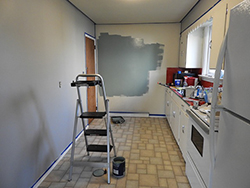 Most Americans have seen ads on television for get-rich-quick seminars that teach novice investors the secrets of making money from housing foreclosure sales. In spite of all the hype, successfully buying and selling foreclosed real estate requires research, money, knowledge, experience and time. Furthermore, buying foreclosed real estate is not without risk. If you plan to try your hand at this type of investing, you need to be well-versed in foreclosure basics. Foreclosure is the legal recourse lenders or governmental agencies have to recoup money owed them because a property owner failed to make payments. The lender/agency can take the house and sell it to satisfy the debt.
Most Americans have seen ads on television for get-rich-quick seminars that teach novice investors the secrets of making money from housing foreclosure sales. In spite of all the hype, successfully buying and selling foreclosed real estate requires research, money, knowledge, experience and time. Furthermore, buying foreclosed real estate is not without risk. If you plan to try your hand at this type of investing, you need to be well-versed in foreclosure basics. Foreclosure is the legal recourse lenders or governmental agencies have to recoup money owed them because a property owner failed to make payments. The lender/agency can take the house and sell it to satisfy the debt.
Generally, the reasons for foreclosure include:
Non-payment of a mortgage/home equity loan.
Inability to meet a balloon payment.
Failure to pay property taxes.
Inadequate insurance coverage for the property.
Inability/failure to maintain the property.
The foreclosure process involves three stages:
Pre-foreclosure – This is the period between the time the homeowner stops making payments and when the land is put up for sale at auction. Investors typically deal with the homeowner during this time.
Auction – This is when the property is taken from the homeowner and sold to the highest bidder. Either the county sheriff or a trustee handles this phase, depending on the state.
Real estate owned (REO) – If no one buys the property at auction or if the lender is the highest bidder, the home becomes “real estate owned” by the bank. Banks usually sell REO properties on the open market through a real estate agent or third-party marketing company.
The most common method of buying a foreclosed property is during a sheriff’s auction or trustee’s sale. These auctions are held on a weekday morning. Investors cannot pay with credit cards, personal checks or IOUs, and they must make a sizable deposit or pay the entire sum for the property on the spot. Typically, potential buyers are not allowed inside the house before bidding begins. The only information prospective buyers have on which to base a purchase decision is what is available through public records searches and a curbside appraisal.
A second risk in sheriff’s auctions and trustee’s sales is that the homes are not guaranteed to come with a clear title. This makes the title search a critical, necessary part of your public records research. If a previous owner with a valid claim surfaces at a later date, you can lose everything you invested.
Also, homes sold at auction sometimes have liens that weren’t erased by foreclosure, such as an IRS debt, that could wipe out any profit you thought you would see from the resale of the property. Procedural errors and court rulings also could stop a foreclosure sale after you have invested time and money. Furthermore, some states have a statutory redemption period, during which time the original homeowner can repay what is owed, regain ownership and leave you with nothing.
Despite all of these potential drawbacks, buying an auctioned home isn’t always a perilous undertaking. Homes foreclosed by reputable lenders who are the first lien holders can be a fairly safe investment. If the deal is completed properly, and you have title insurance, there’s an excellent chance of getting a good title. Properties foreclosed by a government agency, such as the Department of Housing and Urban Development or the Veterans Administration, present less risk. These auctions are conducted online through a marketing company.
Buyers are permitted to examine the homes in advance, conduct inspections and obtain title insurance. The biggest drawback to government auctions is the limited availability of homes. Consequently, available properties attract a large number of interested buyers, which makes it a very competitive market with prices only slightly discounted off current market value.
If you are considering the idea of investing in real estate through buying foreclosed properties, prepare yourself by learning the ins and outs of the process and legal issues, and gathering whatever information you can on the property and parties involved. In doing so, you’ll help to minimize the risk that is inherent with this type of investment.

 Life insurance provides your beneficiaries with financial assistance. In addition to purchasing adequate life insurance coverage, understand if you should list it on your will.
Life insurance provides your beneficiaries with financial assistance. In addition to purchasing adequate life insurance coverage, understand if you should list it on your will. Retirement has always been a tough undertaking but in today’s tumultuous economy, it sometimes seems like an impossible task. There’s no question that countless risks go hand in hand with retirement. However, even during a recession, you can manage these risks. Here are the top five most common retirement risks and the best ways to deal with them:
Retirement has always been a tough undertaking but in today’s tumultuous economy, it sometimes seems like an impossible task. There’s no question that countless risks go hand in hand with retirement. However, even during a recession, you can manage these risks. Here are the top five most common retirement risks and the best ways to deal with them: Pharmacists spend at least six years in college learning about medicine and health. Take advantage of 10 services your pharmacy offers as you get healthier.
Pharmacists spend at least six years in college learning about medicine and health. Take advantage of 10 services your pharmacy offers as you get healthier. In recent years, team building has gained a foothold in corporate America as a fun and effective management tool. To be successful in the business world, employees must be able to effectively plan and execute programs as a team, communicate clearly, use resources efficiently, and be able to adapt to changing circumstances.
In recent years, team building has gained a foothold in corporate America as a fun and effective management tool. To be successful in the business world, employees must be able to effectively plan and execute programs as a team, communicate clearly, use resources efficiently, and be able to adapt to changing circumstances. A flexible work schedule can help you achieve work-life balance, maximize your circadian rhythm or prepare for retirement. You may need to convince your boss that it’s a good idea, though. Use nine tips as you advocate for a flexible work schedule.
A flexible work schedule can help you achieve work-life balance, maximize your circadian rhythm or prepare for retirement. You may need to convince your boss that it’s a good idea, though. Use nine tips as you advocate for a flexible work schedule. According to the forth-quarter 2010 Principal Financial Well-Being Index, 43% of American workers cite the achievement of better overall health as the number one reason they would or do participate in a wellness benefit program. In second place, with 33%, was the reduction of personal health care costs. In third place, with 31%, was the increased chance of living a healthier and extended life.
According to the forth-quarter 2010 Principal Financial Well-Being Index, 43% of American workers cite the achievement of better overall health as the number one reason they would or do participate in a wellness benefit program. In second place, with 33%, was the reduction of personal health care costs. In third place, with 31%, was the increased chance of living a healthier and extended life. As concerns grow about the potential effects of global warming and people pay more attention to reducing their carbon footprints, green construction is becoming a larger part of the solution. A McGraw Hill study found that in 2008 the value of green construction starts might have been as high as $49 billion, and it could reach $140 billion by 2013.
As concerns grow about the potential effects of global warming and people pay more attention to reducing their carbon footprints, green construction is becoming a larger part of the solution. A McGraw Hill study found that in 2008 the value of green construction starts might have been as high as $49 billion, and it could reach $140 billion by 2013. Bidding on residential remodeling projects requires accuracy. With an accurate bid, you show your competence and make a viable living. Consider five//// tips that help you estimate an accurate remodel bid.
Bidding on residential remodeling projects requires accuracy. With an accurate bid, you show your competence and make a viable living. Consider five//// tips that help you estimate an accurate remodel bid. An electrical contractor runs miles of wiring through what will be a three-story office building. Following completion, the contractor tests the wiring, finds it satisfactory and leaves the job. After other subcontractors hang and paint the walls and do other finishing work, the general contractor tests all systems.
An electrical contractor runs miles of wiring through what will be a three-story office building. Following completion, the contractor tests the wiring, finds it satisfactory and leaves the job. After other subcontractors hang and paint the walls and do other finishing work, the general contractor tests all systems.



